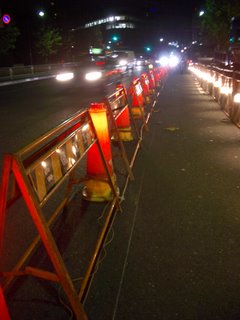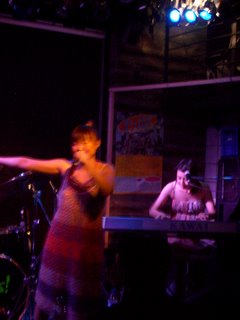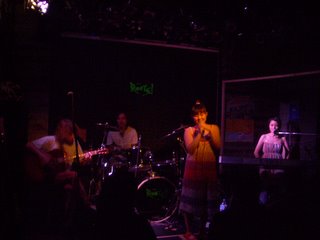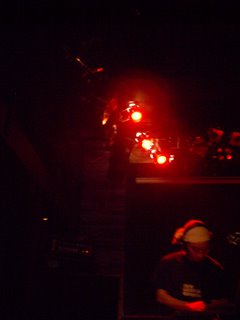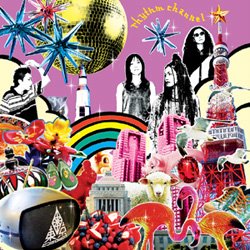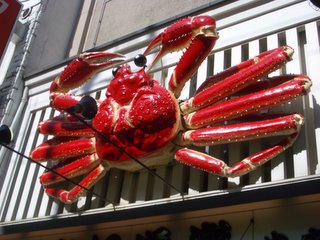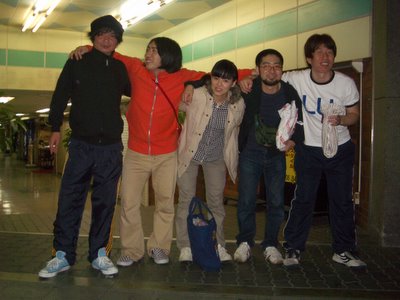
From left, Ken Fujieda, Kana Otsubo and Kiyoaki Sasahara of Spangle call Lilli line
I recently had a chance to interview
Spangle call Lilli line, the brilliant Japanese rock trio that this year released two new albums,
Trace and
For Installation. There was much to talk about with these three musicians. For one thing, the band made a major change in its musical style with
Trace, going from long and luxuriant post-rock-like songs to almost danceable pop numbers in the new album, and I was curious to know what was behind this move.
Spangle is also an interesting band because its three members all have separate full time creative careers: singer Kana Otsubo is an illustrator, guitarist Ken Fujieda is a graphic designer, and the other guitarist, Kiyoaki Sasahara, is a photographer. Why do they continue with this artistic double-life? I wanted to ask them about that.
The band members, in person, were friendly and talkative. In fact, many questions I asked caused them to launch into rap sessions in which they joked, poked fun at each other, came up with involved metaphors, moved far in their talk from the original question and generally had a lively conversation with lots of laughter. These are musicians who really get along with each other. At times I’d almost wonder whether they might have forgotten about my presence because they became so immersed in their talk. But, at the same time, I was happy to be able to hang out with them for more than an hour. I’m not
Rockin’ On magazine, after all, and this is a popular band. That didn’t stop Spangle from telling me fascinating stuff about themselves.
JAPAN LIVE: Can you talk about the beginnings of
Spangle call Lilli line? What led to the band being formed?
OTSUBO: The two of us (Otsubo and Fujieda) met each other by chance at a live house, and we said we should start a band.
FUJIEDA: Yes, we ran into each other at a live house [a rock club]. We hadn’t met in a while, and we had a lot of time on our hands [laughs], and since we met at a live house we decided we should start a band. And we thought two people wouldn’t be enough for a band, and he (Sasahara) had just quit the band that we went to see, and had time, so, in 1999, the three of us started playing in a band together.
JAPAN LIVE: Which live house was it?
FUJIEDA: It was the
Shibuya O-Nest.
JAPAN LIVE: When the band got its start in 1999, what sort of music did you want to play, and who were your influences?
FUJIEDA: To tell you the truth, there was nothing at all! Truly, no concept.
SASAHARA: No plan.
FUJIEDA: No, no plan. We just wanted to go into a rehearsal studio and have guitar sounds come out of the amp, or sing songs using a mike, that was the level we were at, and we didn’t think at all about what sort of band we should be or what our sound should be like. Usually, people get together because they have some sort of music they like in common, but in our case we knew each other from college and were the same age, and because we all went to the same art school we felt we would share the same sort of sensibility.
OTSUBO: We didn’t ask each other about preferences.
FUJIEDA: Yeah, we didn’t ask about the sort of bands or music each likes—
OTSUBO: Because we were friends—
FUJIEDA: We were friends, so we thought everyone would have decent taste, and for the first year or so nothing happened. We didn’t plan to release a CD, or do a show, we just wanted to get together over weekends and it was a way to vent stress.
JAPAN LIVE: How then did you become a band that makes albums and plays shows?
OTSUBO: A year went by, and I had been playing drums the same time that I sang, but that was getting tiring, so we decided to find a drummer. We got Kabasawa (Nobuyuki), who was a friend of all three of us, to join the band, and when we jammed, suddenly our whole sound changed.
FUJIEDA: It showed how bad the drumming was until then [laughs]. All of the sudden, we saw a shape (of how the band should be).
OTSUBO: Yes. It was moving.
JAPAN LIVE: But it’s very surprising you didn’t have an idea about what you wanted the band to be like when you started.
FUJIEDA: If it had been like, let’s do jazz, or let’s do punk, it wouldn’t have been so hard for us. We’re always asked now what we want to do, what sort of music in what genre we want to do, but we still don’t really know, so we make some sounds, bit by bit—
SASAHARA: And move forward—
OTSUBO: And stumble back [laughs]—
SASAHARA: We see whether we can walk across a place or not, and if we sink we go back, and we try climbing mountains, or go to the sea…
JAPAN LIVE: So you see (making music) as a nature thing?
ALL THREE: Yes, a nature thing!
SASAHARA: Like a child of nature—
OTSUBO: We might pick up a mushroom—
SASAHARA&OTSUBO: And get sick eating it—
FUJIEDA: Or get high [laughs]. But there’s really a lot of wasted work involved.
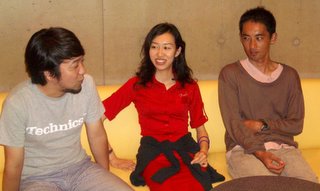 JAPAN LIVE:
JAPAN LIVE: Your new albums
Trace and
For Installation are two very different works, and both are also very different from the previous albums like
Or.
FUJIEDA: Basically we don’t want to do the same things, but our true essence doesn’t change, and the rest is a matter of what sort of format (the album) will be, or what style, or what texture, or sound quality.
JAPAN LIVE: What is the “true essence” of Spangle call Lilli line?
FUJIEDA: Probably, the pure thing that doesn’t change is Otsubo’s melody and singing, or, rather, voice, and whether we play acoustic music or minimalistic electronic music or more band sound type music, we are always trying to make Otsubo’s singing come alive.
SASAHARA: Since it’s the same people (making the music), what comes out, like the smell of sweat, doesn’t change, whether or not you put perfume on it. You still like hamburgers, whether you prepare it Japanese style, or put
demi-grasse sauce on it.
FUJIEDA: You really like hamburgers.
JAPAN LIVE: I like your metaphors.
FUJIEDA: He explains everything by metaphors.
OTSUBO: They are easy to understand.
SASAHARA: But I’ve been trying to talk without using metaphors, recently.
FUJIEDA: Because everyone makes fun of you for that [laughs].
***
JAPAN LIVE: The song lyrics that Otsubo writes are unique, and are almost surreal. How do you get the inspiration for your lyrics?
OTSUBO: When I start out with a song, I sing words that are somewhere between English and Japanese, and ultimately I change those words into Japanese. At that point, I look through the dictionary, or when I listen to what I sang I think ‘this is what it sounds like’ and write that down, or I make up new words. There isn’t really that much meaning (to the lyrics), but sometimes I think somewhere in my memory, for example if I have some memory about this cup [pointing to a black and white cup on the table], I would include the colors black and white in the lyrics, or, if I have memories about a shoe, I think I actually include fragments of that memory, or experience, in my lyrics.
JAPAN LIVE: So in writing your lyrics, you think about both the sound of the words and mental images?
OTSUBO: Yes, I mix both of those. I also want to highlight Japanese words that aren’t used often. It’s a sort of kindness [laughs]. It’s as if, by using in my lyrics Japanese words that don’t usually see the light of day, I’m telling people, look, there are Japanese words like these.
***
JAPAN LIVE: What is the meaning of the band name “Spangle call Lilli line”? Did you come up with it based on how it sounds?
FUJIEDA: Yes, it was chosen 100% based on how it sounds.
SASAHARA: Grammatically, should it actually be “calls”?
FUJIEDA: What do you mean, “grammatically”?
SASAHARA: Spangle calls—
JAPAN LIVE: The ‘call’ in Spangle call is the verb ‘call’?
SASAHARA: Yes. Spangle is calling Lilli line [said in Japanese].
FUJIEDA: It doesn’t come out that way in English.
SASAHARA: Is ‘Spangle’ a singular noun?
JAPAN LIVE: Yes, I guess so.
SASAHARA: So I guess it should be ‘calls’.
JAPAN LIVE: I thought the name was all nouns.
FUJIEDA: Yeah, I think that’s probably what people would think. But the name is all words that Otsubo likes the sounds of, lined together.
JAPAN LIVE: What’s ‘Lilli line”?
OTSUBO: I wanted (the characters) ‘Li’ to be repeated a few times.
FUJIEDA: That’s what it’s about?
OTSUBO: I like girl’s names like Lily. And I like the word lily, as in tiger lily, so I wanted to include ‘Lily’ in the band name.
***
JAPAN LIVE: You all have full-time creative jobs separate from the band. Why did you decide to do both?
FUJIEDA: That’s a difficult issue.
SASAHARA: It wasn’t an intentional thing.
FUJIEDA: We wanted this to be an After Five thing—
SASAHARA: Like a drinking party. We started this as if we were just going to get lunch or something—
FUJIEDA: The music started out as break from work, but then little by little the importance of the music part became bigger, so that now they [the music and full-time jobs] are starting to look about equal in importance. But, after all—
OTSUBO: To us, things haven’t changed.
FUJIEDA: It’s like a hobby.
SASAHARA: It’s not different from going traveling, or going skiing.
FUJIEDA: Although I hate traveling and skiing [laughs]. Even in my hobbies outside of work, I need to be making something. I need to be productive.
OTSUBO: In that sense, I guess being in a band works, because we’re making things.
FUJIEDA: Right. It’s at the same time a great way to vent stress, but also a creative thing—
SASAHARA: We create something that remains.
FUJIEDA: Yes, we create something that remains. Nothing remains after you go traveling.
OTSUBO: Well, how about photos?
SASAHARA: Or experiences?
FUJIEDA: See, that’s what everyone says, but nothing remains.
SASAHARA: He’s never gone abroad.
FUJIEDA: No, I haven’t. In fact, I don’t want to leave Tokyo at all. I’ve only been on a plane once in my whole life.
OTSUBO: And that was for a performance—
FUJIEDA: When I look at an airplane, all I can think is that it’s something that will crash. It just doesn’t make sense that something big like that—
SASAHARA: It shakes a lot.
FUJIEDA: There’s something wrong with it.
OTSUBO: But it’s fun.
FUJIEDA&SASAHARA: It’s not fun at all!
OTSUBO: Some day, I want to fly first class.
FUJIEDA: But that would still be flying. Traveling just feels like a vain thing.
OTSUBO: You don’t even want to, say, go to the beach?
FUJIEDA: I guess it would be fun once I go.
SASAHARA: You should go to Hawaii or some place once. If you go to, say, India, it will probably get you thinking. I don’t really like traveling either, but when I was a student I thought I went just for the experience.
OTSUBO: Where did you go?
SASAHARA: When I was a student, I went to Thailand. And I also went to London and Paris. And to China for work.
FUJIEDA: But you like Tokyo the most, right?
SASAHARA: We’re the same that way.
FUJIEDA: There needs to be a Doutor [a coffee shop chain] and bookstores [laughs]. If there are no Doutor and bookstores, I feel anxious.
JAPAN LIVE: So, no overseas tours are in the works?
FUJIEDA: I don’t think so.
OTSUBO: I want to go!
SASAHARA: If (a tour) is decided, we will force ourselves to go.
FUJIEDA: But I probably wouldn’t want to ride a car for over an hour.
OTSUBO: What?? How about a train then?
FUJIEDA: I wouldn’t want to be on a train for over an hour either. It just feels like it would be time wasted.
SASAHARA: You can read a book.
FUJIEDA: But if I were in a car, I’d get sick. Maybe I just dislike moving from one place to the next.
***
JAPAN LIVE: It’s surprising that you can make great music like you do on a part-time basis, as a break from work.
FUJIEDA: Yes. But it’s because we’re really having fun. And because we’re serious about making the music. So it’s a little different from, say, traveling being your hobby.
OTSUBO: It’s like your hobby is making plastic models, but you made plastic models that are incredible.
FUJIEDA: It’s as if the plastic models you made as a hobby became so elaborate that people were willing to pay money for them. And then, without your knowing it, people started calling them art…
***
JAPAN LIVE: Do you think the next album you make will be as different to
Trace as
Trace was to
Or?
FUJIEDA: I guess it would depend on what sort of mode we are in at that time. But if you ask will it be the same sort of album as
Trace, the answer is ‘no’, it will be very different from
Trace. That’s all we know.
OTSUBO: But what kind of album it becomes will depend on how we three are feeling at that time.
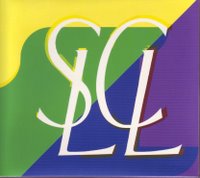
Trace

Or
JAPAN LIVE: Who writes the melodies of your songs?
FUJIEDA: Basically, Otsubo writes the melodies.
OTSUBO: For the song as a whole, I also make suggestion like, how about this for the guitar part? All three of us make parts of the songs.
FUJIEDA: The melodies sometimes are created right away, and at other times they gradually come into being. Sometimes when the musical arrangements change the melody also changes. Rather than making the songs in a clear order, we tend to gradually create new versions, so at least one or two songs on each album end up being completely different from the way it started. We’re not solo musicians making our own songs, so the songs often end up different from what each person intended. They don’t end up the way I would want them to be if I had 100% control over the song-writing. You know what I mean, right [to the others]?
SASAHARA: Yeah, that’s how all of us feel.
OTSUBO: It’s as if we planted sunflower seeds, but what ends up coming out of the ground are morning glory flowers.
FUJIEDA: That’s a hard to understand metaphor!
SASAHARA: We end up with something that is neither sunflower nor morning glory.
FUJIEDA: There’s a lot that is accidental.
JAPAN LIVE: My impression of Spangle call Lilli line’s music was that in your songs you gradually developed musical themes, but in
Trace the themes seem to come right away.
FUJIEDA: That’s right. The peak comes right from the beginning. But that was our aim, structurally we made it in a pop music way. Put it another way, we wanted to do the opposite of the gradual approach. There were people who liked it, and those who didn’t. But Spangle-like elements are still there.
SASAHARA: People who started listening to us from
Trace didn’t think there was anything unusual (about the album) and liked it, but those who knew us from before—
FUJIEDA: Thought it wasn’t quite what they expected.
SASAHARA: Lots of people say
For Installation is more their thing.
FUJIEDA: But we have to be challenging. We have to challenge.
JAPAN LIVE: Will the next album be more like
Trace, or
For Installation, or neither?
FUJIEDA: If we could make something that is neither, that would be best.
SASAHARA: Maybe something that has a southern hemisphere feel.
FUJIEDA: Yeah! We could go to Bali.
SASAHARA: Yeah, it will be relaxing.
JAPAN LIVE: I’ll be looking forward to the new album. Do you have any messages to fans abroad?
SASAHARA: It’s a strange feeling…
FUJIEDA: Yeah, isn’t it a strange feeling?
SASAHARA: It’s a wonder enough that we can release CDs in Japan and that there are people willing to listen to them—
FUJIEDA: Yeah, it’s a wonder.
SASAHARA: So to imagine that happening abroad too—
FUJIEDA: But when it comes to this band, people abroad and Japanese people don’t listen to our music that differently. Because even Japanese people say they don’t understand the meaning of our lyrics [laughs]! No one can really imagine a message or story in the songs. They come up with an image for the songs based on fragmentary interpretations of the songs. So foreigners can be reassured that they are listening to the music in the same way as Japanese fans.
SASAHARA: But aren’t foreigners thinking as they listen to our songs that Japanese people must understand what the lyrics mean?
FUJIEDA: But the truth is that Japanese people don’t understand either.
SASAHARA: Foreigners are probably enjoying the songs purely based on the music rather than the way Japanese people do, which is by also listening to the words.
***
SASAHARA: I’d like to know what kind of music foreigners who like our music enjoy other than Spangle.
FUJIEDA: It must be no different from the way we listen to (foreign bands like) Sonic Youth or Tortoise.
SASAHARA: What I mean is, are there people who like Madonna but also Spangle, or are there people who like Tortoise and also Spangle—
FUJIEDA: I guess it depends on the person.
***
OTSUBO: Anyway, the message…
SASAHARA: All we can say is thanks. Thanks for finding us.
OTSUBO: Yes.
SASAHARA: We appreciate your reaching us.
